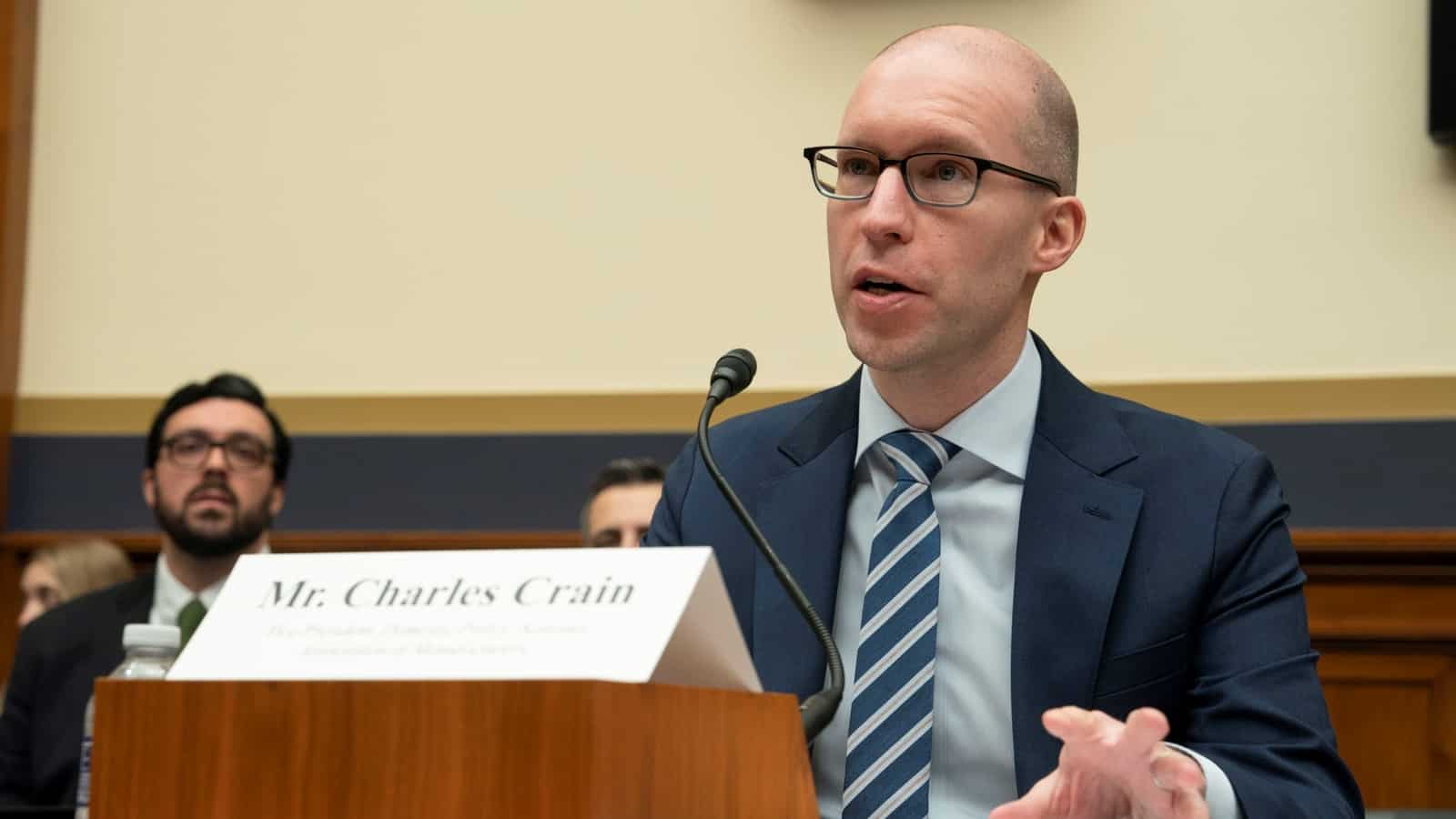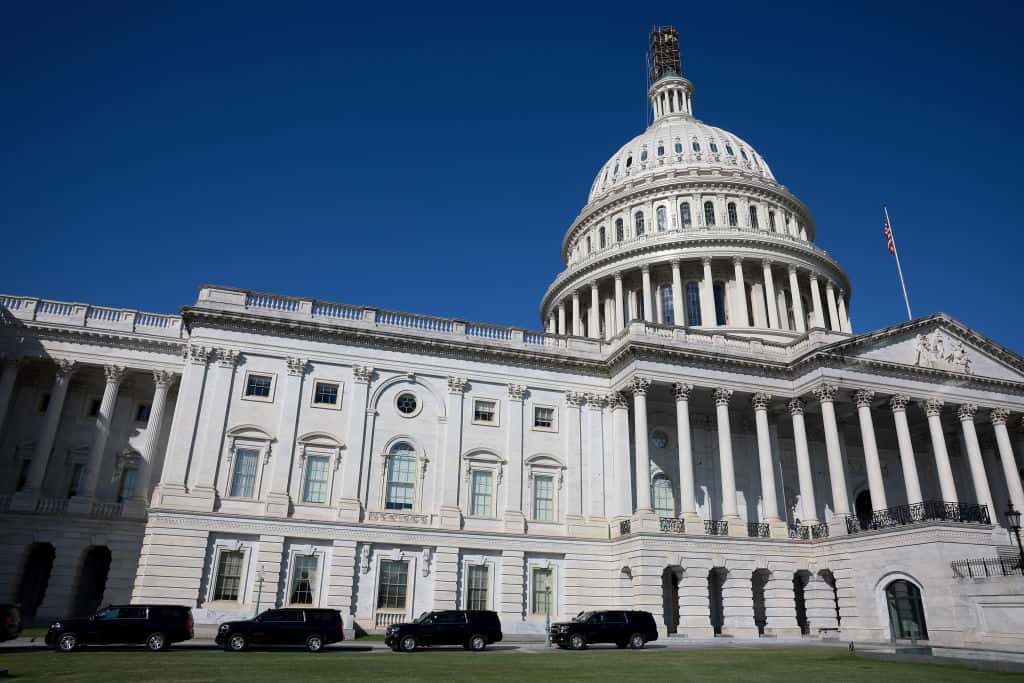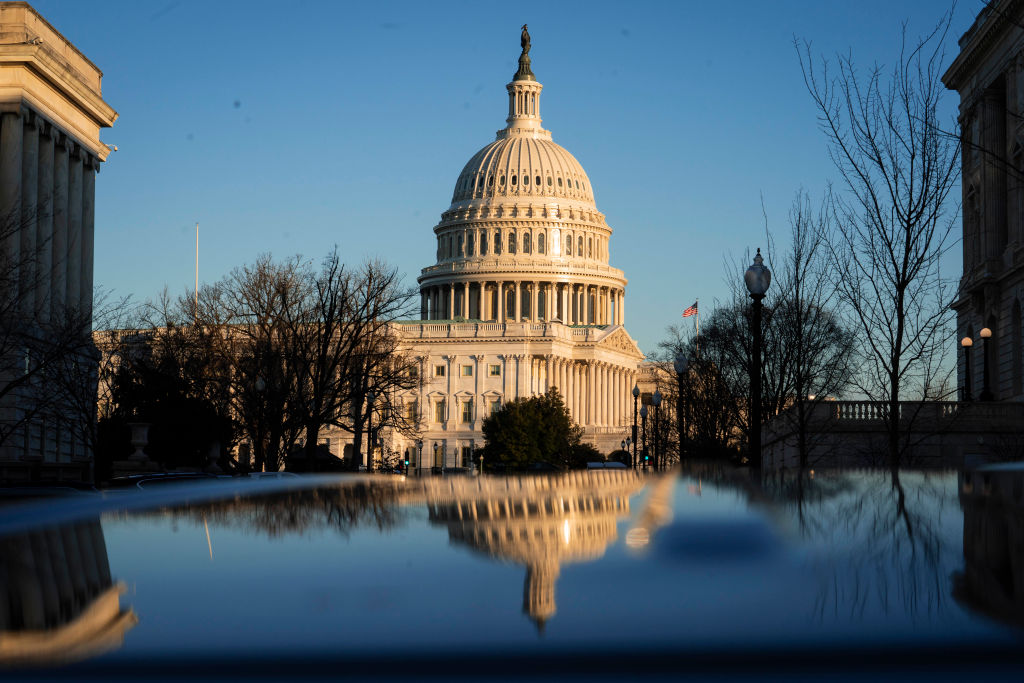House Passage of Tax Priorities a Win for Manufacturers, Counting on Senate to Act Swiftly
Washington, D.C. – Following House passage of the Tax Relief for American Families and Workers Act of 2024, National Association of Manufacturers President and CEO Jay Timmons and Ketchie President and Owner and NAM Small and Medium Manufacturers Group Chair Courtney Silver released the following statement:
“Manufacturers thank Speaker Johnson and Chairman Smith for their leadership in passing the Tax Relief for American Families and Workers Act—and the bipartisan work in the House and Senate to secure progress for America’s manufacturing workers,” said Timmons.
“Manufacturers are now counting on the Senate to act quickly to restore these provisions that are absolutely critical to strengthening America’s competitiveness and growth of manufacturing in America,” Timmons added. “We cannot afford to wait. The cost of delay or inaction will be measured in lost jobs and slower wage growth, along with investment ceded to other countries. Passing this legislation, however, will ensure that small manufacturers, who are the backbone of communities and foundation of America’s supply chain, can continue driving our nation forward.”
“When key tax provisions expired, it wasn’t just businesses like Ketchie that felt the pinch—it was our ability to support and create jobs that took a hit,” said Silver. “I thank Speaker Johnson and Chairman Smith for their efforts to ensure passage of the Tax Relief for American Families and Workers Act. This isn’t just about numbers on financial statements; it’s about taking care of people who make things in America and work at small manufacturing companies across our country.”
-NAM-
The National Association of Manufacturers is the largest manufacturing association in the United States, representing small and large manufacturers in every industrial sector and in all 50 states. Manufacturing employs nearly 13 million men and women, contributes $2.85 trillion to the U.S. economy annually and accounts for 53% of private-sector research and development. The NAM is the powerful voice of the manufacturing community and the leading advocate for a policy agenda that helps manufacturers compete in the global economy and create jobs across the United States. For more information about the NAM or to follow us on Twitter and Facebook, please visit www.nam.org.
NAM to Congress: Pass Crucial Tax Legislation Now

Earlier this month, Congress unveiled the bipartisan Tax Relief for American Families and Workers Act—and now it’s time it passed the legislation, the NAM recently urged congressional leaders.
What’s going on: The bipartisan tax package—a compromise between House Ways and Means Committee Chairman Jason Smith (R-MO) and Senate Finance Committee Chairman Ron Wyden (D-OR)—would restore immediate R&D expensing for businesses, reinstate full expensing (also known as 100% accelerated depreciation) for businesses’ capital investments and return the U.S. to a pro-growth interest deductibility standard.
- Thanks to the NAM’s advocacy, the House Ways and Means Committee supported moving the legislation to the House floor by a bipartisan vote of 40–3.
- A vote on the House floor is expected tomorrow or Thursday, thanks in part to the NAM’s work.
Why it’s important: “All three of these tax policies have a long history of bipartisan support and are critical to strengthening America’s global competitiveness,” the NAM, along with more than 260 other businesses and allied groups, told House Speaker Mike Johnson (R-LA), House Minority Leader Hakeem Jeffries (D-NY), Senate Majority Leader Chuck Schumer (D-NY) and Senate Minority Leader Mitch McConnell (R-KY) earlier this month.
- The policies “have enabled U.S. businesses to innovate, create [well]-paying jobs, protect our national security and remain at the cutting edge of the global economy. Restoring these provisions will have a profound impact on business investment, economic growth and job creation.”
Small businesses: The policies are particularly crucial for small- and medium-sized manufacturers, said Courtney Silver, president and owner of precision machining company Ketchie Inc. group chair of NAM Small and Medium Manufacturers Group.
- The absence of these three tax “provisions directly impacts our ability to invest in new technology, to purchase equipment and to create jobs,” she said.
- “Nearly 90% of manufacturers share similar concerns about their higher tax burden, and if left unaddressed, our companies and our teams will have a harder time securing an edge over our global competitors. … Passing this law would give companies like ours the certainty needed to plan for growth and more investments.”
What you can do: Your members of Congress need to continue to hear why it is imperative they support this tax package. Add your voice at the NAM’s Tax Action Center.
Small Manufacturer: Tax Legislation Restores Commonsense Provisions, Would Provide Big Jolt for Manufacturers of all Sizes
Washington, D.C. – Ketchie President and Owner and National Association of Manufacturers Small and Medium Manufacturers Group Chair Courtney Silver released the following statement calling on Congress to advance key tax priorities included in the Tax Relief for American Families and Workers Act of 2024.
“There is so much at stake for small and medium-sized manufacturers as Congress debates pro-growth tax policy, which is why I strongly support the Tax Relief for American Families and Workers Act,” said Silver. “When Congress allowed immediate R&D expensing, interest deductibility and full expensing to expire, it created a higher tax bill and tremendous uncertainty for businesses like mine. The loss of these provisions directly impacts our ability to invest in new technology, to purchase equipment and to create jobs. Nearly 90% of manufacturers share similar concerns about their higher tax burden, and if left unaddressed, our companies and our teams will have a harder time securing an edge over our global competitors.
“This legislation restores those commonsense provisions, which would be a big jolt for manufacturers of all sizes. Passing this law would give companies like ours the certainty needed to plan for growth and more investments in our future.”
-NAM-
The National Association of Manufacturers is the largest manufacturing association in the United States, representing small and large manufacturers in every industrial sector and in all 50 states. Manufacturing employs nearly 13 million men and women, contributes $2.85 trillion to the U.S. economy annually and accounts for 53% of private-sector research and development. The NAM is the powerful voice of the manufacturing community and the leading advocate for a policy agenda that helps manufacturers compete in the global economy and create jobs across the United States. For more information about the NAM or to follow us on Twitter and Facebook, please visit www.nam.org.
Timmons: Biden Administration’s Agencies Are Undercutting the President’s Own Stated Goals Again with LNG Decision
Washington, D.C. – Following the Department of Energy’s announced freeze on export permits for new liquified natural gas projects, National Association of Manufacturers President and CEO Jay Timmons released the following statement:
“Once again the Biden administration’s agencies are undercutting President Biden’s own stated goals. The president has said the following:
- ‘Where is it written that America can’t lead the world in manufacturing again? … Now, thanks to all we’ve done, we’re exporting American products and creating American jobs.’[1]
- ‘This nation used to lead the world in manufacturing, and we’re going to do it again.’[2]
- ‘We just have to remember who we are. We’re the United States of America…There’s not a single thing we can’t do when we put our minds to it. And we can strengthen our energy security now, and we can build a clean energy economy for the future at the same time. This is totally within our capacity.’’[3]
- ‘[W]e’re working closely with Europe and our partners to develop a long-term strategy to reduce their dependence on Russian energy.’[4]
- ‘[W]e’re a great nation. We’re the greatest nation on the face of the earth. We really are. That’s the America I see in our future.”[5]
“Manufacturers call on the president to direct his agencies to support his agenda and to end their political war on the manufacturers who power American jobs, our economy and our national security. Today’s decision weakens our country, while giving Russia an upper hand as Europe and Asia look to transition their energy needs.”
[1] State of the Union Address, Feb. 7, 2023.
[2] Remarks at a Political Rally Hosted by Union Members, June 17, 2023.
[3] Remarks on Actions to Strengthen Energy Security and Lower Costs, Oct. 19, 2022.
[4] Remarks Announcing U.S. Ban on Imports of Russian Oil, Liquefied Natural Gas and Coal, March 8, 2022.
[5] Remarks at First Campaign Speech of the 2024 Election, Jan. 5, 2024.
-NAM-
The National Association of Manufacturers is the largest manufacturing association in the United States, representing small and large manufacturers in every industrial sector and in all 50 states. Manufacturing employs nearly 13 million men and women, contributes $2.85 trillion to the U.S. economy annually and accounts for 53% of private-sector research and development. The NAM is the powerful voice of the manufacturing community and the leading advocate for a policy agenda that helps manufacturers compete in the global economy and create jobs across the United States. For more information about the NAM or to follow us on Twitter and Facebook, please visit www.nam.org.
NAM to Congress: SEC Must Fix Flawed Climate-Reporting Rule

The Securities and Exchange Commission’s pending climate disclosure rule would place an enormous, untenable burden on manufacturers—and impose a disproportionate hardship on small businesses, NAM Vice President of Domestic Policy Charles Crain told lawmakers Thursday.
What’s going on: Crain gave testimony before the House Financial Services Subcommittee on Oversight and Investigations on the damaging effects of the SEC’s proposed climate rule, which would require businesses to reveal large amounts of convoluted (and often sensitive) climate-related data.
- The plan would force disclosure of so-called “Scope 3” emissions—those that come from companies’ supply chains—and institute new climate-related accounting requirements, among other mandates.
Why it’s a problem: If finalized, the rule would divert funds from manufacturing growth, including at small manufacturers.
- “Manufacturing pioneers groundbreaking technologies, including the innovations necessary to combat climate change,” Crain said. “The rule would impose tremendous costs on manufacturers of all sizes—while overwhelming investors with immaterial information. And the SEC hasn’t done the work to show that the rule’s benefits outweigh its costs, or that the rule is even within the SEC’s legal authority.”
- The proposed regulation would, by the agency’s own accounting, “raise the cost to businesses of complying with its overall disclosure rules to $10.2 billion from $3.9 billion, an additional cost of about $530,000 a year for a bigger business,” according to The Wall Street Journal (subscription).
Costs to manufacturers: Crain told lawmakers that the SEC’s analysis likely understates the true costs of the rule, in part because the agency did not consider the impacts on private businesses.
- “For the larger companies subject to [the Scope 3] requirement, the SEC has admitted that it cannot ‘fully and accurately quantify’ the costs,” Crain said. “But for the small businesses that are swept into large companies’ Scope 3 efforts, the SEC hasn’t even tried. The SEC’s proposal does not include any discussion of the Scope 3 costs that will fall on small and private businesses.”
- Crain warned lawmakers that these compliance costs would represent a “huge resource diversion” for small manufacturers.
Regulatory onslaught: Crain shared the NAM’s landmark Cost of Federal Regulations study with lawmakers, explaining that the SEC’s proposal would add to the $50,000-per-employee-per-year regulatory burden small manufacturers face.
- “The SEC’s climate rule is at the center of this regulatory onslaught,” Crain said.
NAM in the news: Bloomberg (subscription), Law360 and Pensions & Investments all covered the NAM’s testimony.
Manufacturing Associations Descend on Capitol Hill to Press for Renewal of Miscellaneous Tariff Bill
Washington, D.C. – Yesterday, the National Association of Manufacturers, American Chemistry Council and CropLife America, along with representatives from 16 manufacturing companies and other business and agriculture groups, joined together to meet with 17 congressional offices, including 15 lawmakers and staff on the House Ways and Means Committee, urging immediate action to renew the Miscellaneous Tariff Bill.
“Manufacturers in the U.S. cannot afford this direct economic hit and need action to be taken as soon as possible. Passing MTB legislation will increase competitiveness, spur growth and support the success of manufacturers, farmers, businesses, workers, consumers and communities throughout the U.S., said the NAM.
“The American Chemistry Council and our members support the renewal of the Miscellaneous Tariff Bill. The MTB would support advanced manufacturing in the United States and domestic chemical production used to make products in key agriculture and food production and industrial sectors, including information technology, renewable energy and automotive goods.”
“The passage of a Miscellaneous Tariff Bill that is fully retroactive would help maintain farmers’ access to the essential pesticide products they need to grow food for the U.S. and the world. A renewed MTB would mean lower input prices resulting in decreased price pressures for U.S. farmers, ranchers and consumers,” said CropLife America.
The previous MTB expired in December 2020, and since then, manufacturers and other businesses continue to pay $1.3 million per day in tariffs—that amounts to $1.5 billion over three years that should and can be invested in job creation and innovation.
-NAM-
The National Association of Manufacturers is the largest manufacturing association in the United States, representing small and large manufacturers in every industrial sector and in all 50 states. Manufacturing employs nearly 13 million men and women, contributes $2.85 trillion to the U.S. economy annually and accounts for 53% of private-sector research and development. The NAM is the powerful voice of the manufacturing community and the leading advocate for a policy agenda that helps manufacturers compete in the global economy and create jobs across the United States. For more information about the NAM or to follow us on Twitter and Facebook, please visit www.nam.org.
-CropLife America-
Established in 1933, CropLife America (www.croplifeamerica.org) represents the developers, manufacturers, formulators, and distributors of plant science solutions for agriculture and pest management in the United States. CropLife America’s member companies produce, sell, and distribute virtually all the necessary and vital pesticide and biotechnology products used by American farmers. CLA can be found on Twitter at @CropLifeAmerica.
-American Chemistry Council-
The American Chemistry Council’s mission is to advocate for the people, policy, and products of chemistry that make the United States the global leader in innovation and manufacturing. To achieve this, we: Champion science-based policy solutions across all levels of government; Drive continuous performance improvement to protect employees and communities through Responsible Care®; Foster the development of sustainability practices throughout ACC member companies; and Communicate authentically with communities about challenges and solutions for a safer, healthier and more sustainable way of life. Our vision is a world made better by chemistry, where people live happier, healthier, and more prosperous lives, safely and sustainably—for generations to come.
“March-In” Rights Would Harm Manufacturing, Economy

So-called “march-in” rights that would enable the federal government to seize manufacturers’ intellectual property are “a major threat to manufacturers in America,” according to a new seven-figure ad campaign launched by the NAM.
What’s going on: Last month, the Biden administration issued a proposal that would allow the government to take over privately held patents if those patents had been developed in part with federal research dollars.
The problem: Undermining companies’ IP rights would roll back the progress made under the Bayh-Dole Act, which allowed for commercialization of federally funded research and “unlocked all the inventions and discoveries that had been made in laboratories throughout the United States with the help of taxpayers’ money,” according to a recent op-ed in The Hill.
- Because the government is “inviting march-in petitions on every patented technology that benefited from even modest federal grants,” the proposal could “decimate American innovation [and] … stifle investment in climate change, sustainable agriculture, advanced computing, energy, medicines” and more, according to the op-ed writers, two former undersecretaries of commerce for intellectual property.
- In addition, the proposal is “putting American jobs at risk,” according to the NAM’s new ad.
The NAM says: “This radical new proposal is a major threat to manufacturers in America and counter to the president’s goals of growing the sector,” NAM President and CEO Jay Timmons said.
- “Empowering the government to march in and seize the rights to private-sector patents and technologies threatens American innovation and R&D, putting millions of well-paying manufacturing jobs at risk. Policymakers must protect manufacturers’ intellectual property rights and stop this government overreach.”
Congressional Tax Writers Unveil NAM-Supported Tax Deal

On Tuesday, Congress took an important step toward restoring three of manufacturers’ top tax priorities, as key congressional leaders unveiled a bipartisan tax agreement long sought by the NAM.
What’s going on: The $78 billion Tax Relief for American Families and Workers Act—a compromise between House Ways and Means Committee Chairman Jason Smith (R-MO) and Senate Finance Committee Chairman Ron Wyden (D-OR)—would restore immediate R&D expensing, return to a pro-growth interest deductibility standard and reinstate full expensing (also known as 100% accelerated depreciation) for businesses’ capital investments.
- The framework also includes disaster tax relief and $33 billion to partially extend a child tax credit expansion from 2021.
The background: For nearly seven decades, the tax code allowed businesses to deduct R&D costs immediately. But starting in 2022, a change required companies to amortize the costs over a period of years.
- Also in 2022, a stricter interest limitation—which acts as a tax on investment—went into effect. And last year, full expensing began to phase down.
The NAM’s role: The NAM was instrumental in the deal, having made the business case for the tax provisions’ reinstatement to lawmakers for many months, including via an ad campaign, “Keep America Resilient.”
What’s next: The NAM is urging congressional leadership to schedule a vote on the tax deal. Manufacturers can add their voices at the NAM’s Tax Action Center.
Our take: “Manufacturers appreciate Chairman Smith and Chairman Wyden’s work to reach a bipartisan tax deal with key provisions to advance U.S. economic competitiveness and support manufacturing job creation,” NAM Managing Vice President of Policy Chris Netram said in a social post Tuesday.
- “Congress must move this legislation forward immediately. The time to act is now.”
NAM in the news: Bloomberg Tax (subscription) cited the NAM’s support of the legislation, while Punchbowl News reported on the NAM’s ads in multiple Kentucky papers and Louisiana’s Shreveport Times urging support of the legislation.
Policymakers Demand Tax Action

On Thursday, members of Congress took to the House floor to show their strong support for manufacturers’ top tax priorities.
- The NAM is waging an all-out campaign to restore these pro-growth provisions, and key House members added their voices by calling on congressional leadership to schedule a vote as soon as possible.
What’s going on: Yesterday evening, a group of House members lined up for short speeches urging their peers in the chamber to join them in making three immediate tax changes: reinstating immediate R&D expensing; loosening a strict interest limitation; and returning to full expensing (also known as 100% accelerated depreciation) for capital investments.
- Kevin Hern (R-OK) highlighted the harm to America’s competitiveness caused by Congress’ failure to act, asking, “How can we expect to compete with China when it is more expensive to invest, innovate and grow here in the United States of America?”
- Jodey Arrington (R-TX) echoed that message, saying Congress can “supercharge America’s competitiveness” by giving businesses the certainty to plan job-creating investments.
Why it’s important: Without the restoration of immediate R&D expensing, a pro-growth interest deductibility standard and full expensing for capital investments, manufacturing jobs, R&D and competitiveness will all be in jeopardy.
- In the NAM’s Q4 2023 Manufacturers’ Outlook Survey, 89% of respondents said higher tax burdens on manufacturing activities would make it more difficult to expand their workforces, invest in new equipment or expand their facilities.
Take action: Manufacturers’ voices are crucial during the ongoing negotiations. Visit our Tax Action Center to send your own message about these tax priorities directly to Congress.
ICYMI: House Members Urge Passage of Critical Manufacturing Tax Policies
Washington, D.C. – Following a series of speeches on the House floor calling for swift passage of legislation that will restore pro-growth manufacturing tax policies, National Association of Manufacturers Managing Vice President of Policy Chris Netram released the following statement:
“House and Senate tax leaders reaching a bipartisan agreement on key manufacturing priorities is a positive development—but it is only a critical first step. Now the whole of Congress must approve legislation that restores immediate R&D expensing, a pro-growth interest deductibility standard and full expensing for capital investments. Every day that they fail to act makes it more difficult for manufacturers to drive innovation and investment and hampers our ability to create jobs and raise wages in the United States.”
Below are select remarks from congressional members on the importance of restoring pro-growth tax policies.
“Since the beginning of 2022, businesses have been required to spread out or amortize R&D expenses.… Since amortization took place, the growth rate of R&D spending has slowed dramatically, from 6.6% on average over the previous six years to less than one half of 1% over the last 12 months.
“The time to address R&D amortization was at the end of 2021. The next best time is now. We need to pass R&D immediate expensing for the American people and our U.S. economy.”
“Last year, the U.K. announced its commitment to make permanent its pro-growth policy for full expensing. The U.S. should be looking to do the same to remain competitive in the global marketplace…. This is more than just an economic issue. This is a national security issue.
“How can we expect to compete with China when it is more expensive to invest, innovate and grow here in the United States of America?”
“It is imperative that we make the TCJA permanent. For example, if we cement the Tax Cuts and Jobs Act, we can reverse the current limitation on the deductibility of interest payments on business loans that will save over 850,000 American jobs.
“Another example is in research and development. While it was once a paid expense, R&D is now a cost that many small businesses cannot afford. China is subsidizing their R&D costs, giving them a huge advantage over the United States. Modernization and national security shouldn’t suffer because of an elapsed tax change. Our tax code should work for American workers and businesses and not against them.”
-NAM-
The National Association of Manufacturers is the largest manufacturing association in the United States, representing small and large manufacturers in every industrial sector and in all 50 states. Manufacturing employs nearly 13 million men and women, contributes $2.85 trillion to the U.S. economy annually and accounts for 53% of private-sector research and development. The NAM is the powerful voice of the manufacturing community and the leading advocate for a policy agenda that helps manufacturers compete in the global economy and create jobs across the United States. For more information about the NAM or to follow us on Twitter and Facebook, please visit www.nam.org.
